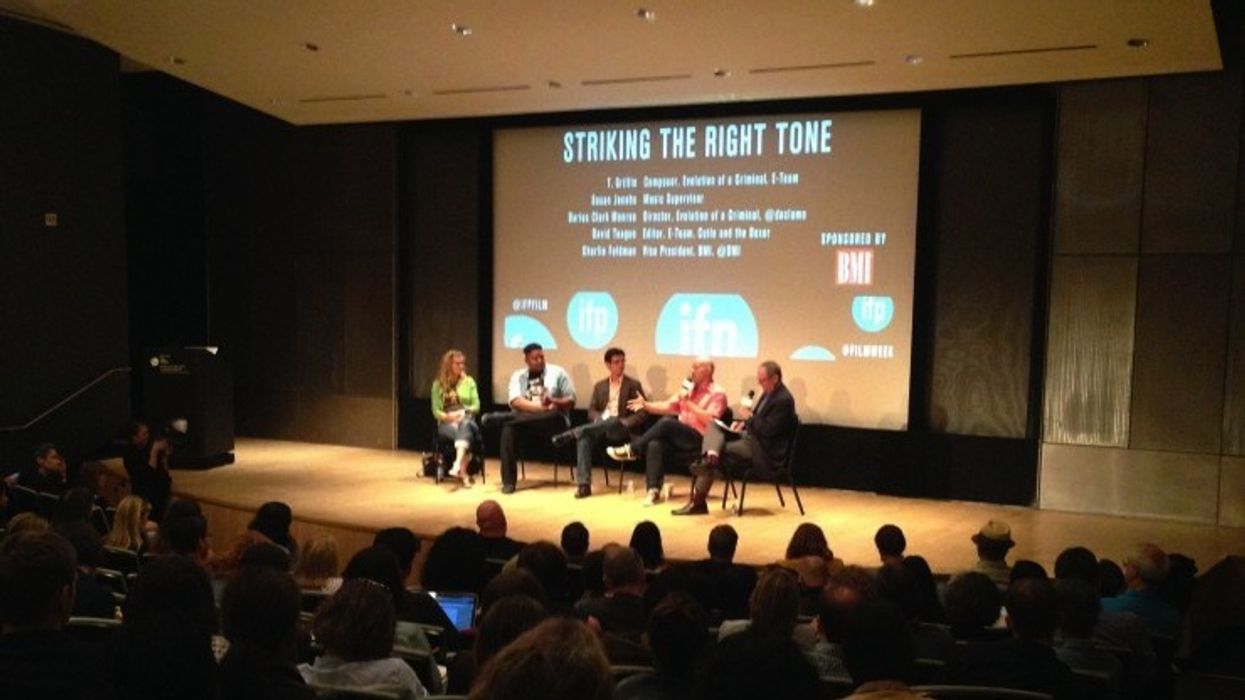Striking the Right Tone: The Art of Music Supervision in Indie Docs
IFP Film Week

Music costs money, and is surrounded by a morass of often-confusing legal rights which can flummox any filmmaker, and especially an indie one. Furthermore, placing music in any film is difficult, and this is doubly the case when the film is a documentary, since a narrative structure is not in place via script, but has to be assembled, and frequently directors find themselves climbing the walls over this most important aspect of their film. Luckily, the Music Supervisor is there to help navigate the often confusing world of music publishing and licensing.
At IFP Film Week, Susan Jacobs, who has worked on over 88 films, that run the gamut from American Hustle to low-budget indie productions, sat down with composer T. Griffin, director Darius Clarke Monroe, V.P. of music publishing giant B.M.I., Charlie Feldman, and editor and cinematographer David Teague, for a discussion on how music works in documentary film (though much of their advice is applicable to narrative features, as well).
Regardless of the size of your production, if you're using a commercial song, then you have to work with the publishing company of the song (usually administered by ASCAP or B.M.I., who hold the rights to literally thousands of songs, representing composers, artists, rights holders, and everyone in between), and there can be (and usually are) multiple licenses to obtain. If you are using an original version of the song, then you must get "Performance" and "Synchronization" licenses, or, a license to use the song, and a license to sync said song to your film. If you're using a cover version, it can be slightly cheaper. Below, some takeaways you might find helpful in your own work:
The Role of the Supervisor
A music supervisor can do many things for a film, from help select songs, to acting as a liaison between the filmmaker and the composer; since many filmmakers are more visual than musical, it can be helpful to have someone around to translate the sometimes vague ideas of a director into concrete musical directives a composer can follow. The supervisor also makes sure that music is being used in the right way. In a documentary, frequently early cuts feature wall-to-wall music, neglecting the power of silence in a film. A good supervisor, according to Jacobs, is an expert at "riding the narrative," and using music to establish tempo, handle transitions, and, in documentary films, especially, focus the attention of the viewer on the subject of the film. Also, they help obtain musical pieces that fill in the gaps not filled by the film's composer. Because the main job is to, "pull people into the story."
Cheap Tunes
There are plenty of resources out there for the indie filmmaker looking to score their film on the cheap. According to Jacobs, every skit on Saturday Night Live is scored with music that comes from Music Libraries which feature extensive, relatively cheap and easy to use pieces which are available for filmmakers; prices range from free to thousands of dollars, but these are great resources for filmmakers. The internet itself, obviously, and as always, is the best resource for a low-budget indie filmmaker. Seek and ye shall find. Though it used to be cheaper to license music for documentaries, after the success of films like Michael Moore's Roger and Me, publishing companies realized there was money to be made from what had generally been looked at as a tertiary market
Temp Love
A phenomenon common to film directors (and editors) can be falling in love with the temporary track they use as a guide to edit the film, before final selection of a soundtrack is made. For this reason, the panel recommended bringing on the music supervisor at the same time as the editor, so the two can work in concert, and musical heartbreak can be more easily avoided.
No matter what your budget, and whether you choose to (or have the means to) hire a composer or music supervisor, use a library, or even enlist the help of your neighbor who plays guitar, music is an integral part of any film, and these general guidelines are useful for both narrative and documentary films. Furthermore, with the proliferation of Digital Audio Workstations (DAWs) like ProTools and Logic, the DSLR revolution is being matched by a revolution in the ability of filmmakers and composers to produce high quality music cheaply. Check out this piece on elementary EQing for indie films. And remember, sometimes silence is golden. And make sure to stay tuned (on the internet) for more from IFP Film Week!
Source: IFP Film Week











